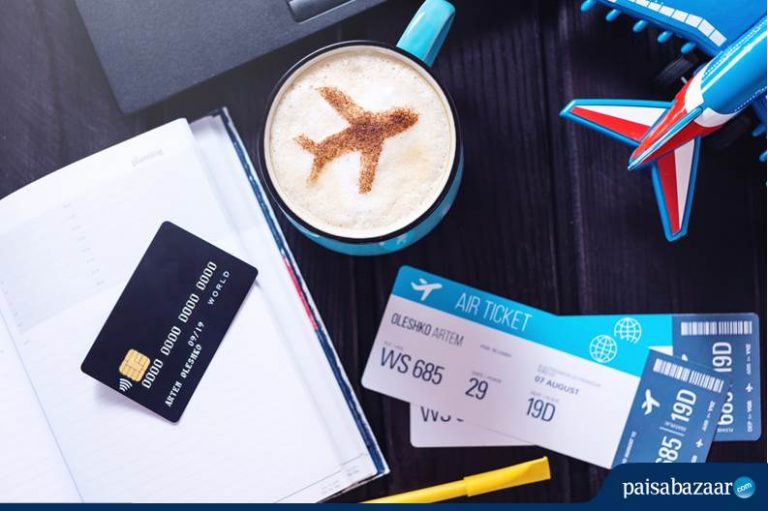Paisabazaar app Today!
Get instant access to loans, credit cards, and financial tools — all in one place
Our Advisors are available 7 days a week, 9:30 am - 6:30 pm to assist you with the best offers or help resolve any queries.
 Get the App
Get the App

Get instant access to loans, credit cards, and financial tools — all in one place

Scan to download on

Our Advisors are available 7 days a week, 9:30 am - 6:30 pm to assist you with the best offers or help resolve any queries.

Travel credit cards can be an excellent option for frequent travellers. With benefits like complimentary flight tickets, air miles, lounge access, direct discount on travel booking, etc., cardholders can save a significant amount and, at the same time, make their trips more convenient. However, with so many travel credit cards available in the market today, selecting the most suitable one for your travel expenses can be a challenging task. Each card comes with its own value-back system, which caters to different travel needs and hence is one of the key factors that you must compare while picking the best travel credit card. Along with this, your own travel preferences must be taken into consideration as well.
To find the best travel credit card for your needs, here are a few things to take into account.
Most travel credit cards with substantial value-back options are generally co-branded with popular airlines like Air India, IndiGo or travel portals like EaseMyTrip, Yatra and Ixigo. These cards often come with complimentary memberships to brand loyalty programs and discount or accelerated rewards on making travel bookings through the associated platforms. Usually, the points earned on such cards are redeemable only on the partner platforms, thus limiting the flexibility.
On the other hand, brand-agnostic travel credit cards, like Axis Atlas and American Express® Platinum Travel Credit Card, offer accelerated reward points or air miles on your card spends. These accrued rewards can later be redeemed against various options, including conversion to airline or hotel loyalty points.
Premium all-rounder credit cards with a high reward rate across all categories could also help high-spenders accumulate substantial reward points and redeem them to avail free flight tickets or hotel stay vouchers. For example, the reward points earned on HDFC Diners Club Black Credit Card can be converted into air miles in 1:1 ratio, giving excellent value to high-spenders and travellers.
If you prefer to fly with a specific carrier or make bookings through a particular portal, getting a co-branded card could provide you better savings. On the other hand, general travel cards would suit those who do not have brand inclinations when it comes to travel, instead prioritize savings over brand loyalty.
Different travel credit cards would reward you in different forms. Some cards may offer accelerated reward points or cashback on travel spends; others might offer direct discount on your bookings. Most travel cards also come with generous welcome or milestone benefits wherein you could avail substantial value-back on reaching a quarterly or yearly spend threshold.
While comparing travel credit cards, it is important to check the reward rate, redemption value and the available redemption options. You should also check if it would be feasible for you to reach the spend milestones to avail additional benefits.
Besides rewards and other spend-based benefits, most travel credit cards also provide additional benefits such as complimentary airport lounge access, complimentary membership to airline or hotel loyalty programs, travel insurance, low or no forex mark-up fee, etc. Though these features should not be the only deciding factor for card selection, they should still be taken into consideration to understand how beneficial the card could be for your travel needs. For instance, if you travel multiple times in a year, complimentary lounge access could be quite a valuable feature for you. Similarly, if you frequently travel abroad, a card with international lounge access or low forex mark-up fee could be beneficial for you.
Most credit card features come with a list of exclusions and associated terms and conditions. Discount on flight tickets could come with a maximum capping, lounge access could come with spend-based eligibility, flight vouchers could be redeemable only for select journeys. Hence, when choosing a travel card, it is important to read the fine print to understand whether the applicable terms and conditions could make it difficult for you to extract maximum value out of the card.
Before you compare cards on the above parameters, you should first check your eligibility for the cards and the annual fee that you are willing to pay for travel benefits. Highly rewarding travel credit cards generally fall in the fee range of Rs. 1,500 to Rs. 5,000 but if you are looking for extensive all-round benefits, in addition to travel benefits, you might want to consider premium cards with fees going as high as Rs. 50,000. Premium cards also come with high income eligibility and everyone may not qualify for them.
Picking the right travel credit card requires an in-depth analysis of your own travel needs, your preferred form of value-back, understanding how a card’s rewards program works, how efficiently you can maximize the benefits, etc. When chosen mindfully by taking the above discussed points into account, travel credit cards can prove to be an asset for frequent travellers and help them save considerably.
Note: An edited version of this article was published on The Hindu on 9th September 2024.